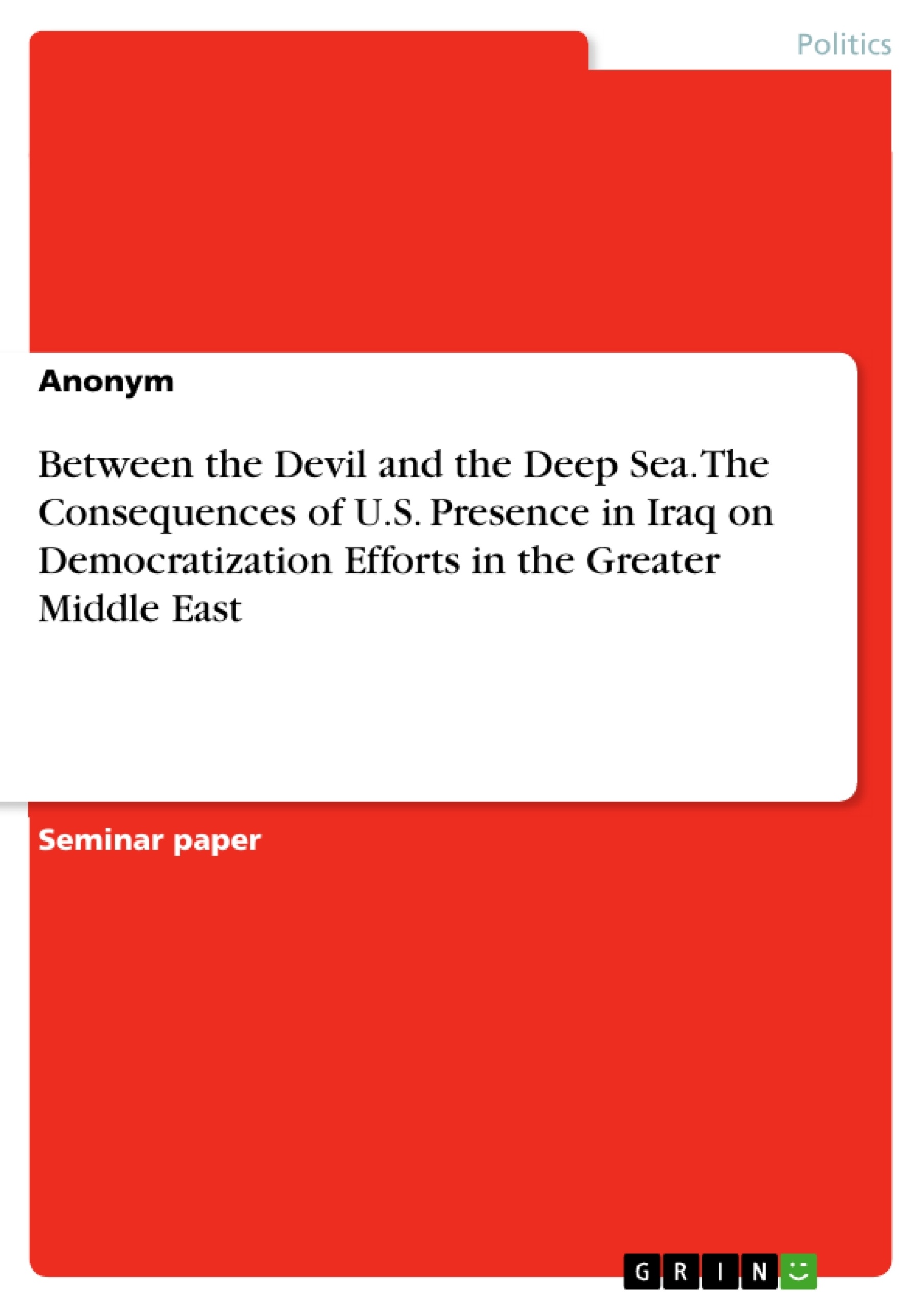Even though the U.S. invasion of Iraq in 2003 was widely protested around the globe, nobody
would actually deny the fact, that the removal of its cruel dictator Saddam Hussein was in itself a
good thing. As part of the Greater Middle East Initiative, the U.S. hoped to spark democratization
in one of the most undemocratic regions in the world. Yet, if one takes a closer look at the
preconditions, it becomes clear that America’s decision was essentially like choosing between the
devil and the deep sea – the decision to invade Iraq had as many negative consequences as to
refrain from acting.
This paper will assess the negative consequences of the U.S. American invasion of Iraq
on the democratic development in the Greater Middle East area. I intend to look at the social and
political developments in various authoritarian regimes before the year 2003 and compare and
contrast it to the 2005 status quo.
The example of Iran will be closely analyzed in a case study; to see what changes the
invasion of Iraq has brought about in Iran. The underlying hypothesis is, that U.S. presence in
Iraq has increased radicalism among Iranian leaders, and decreased the countries chances to
democratize. I will look anti-democratic sentiments and actions among Iranian leaders before and
after the war in Iraq to assess whether this hypothesis holds true.
Inhaltsverzeichnis (Table of Contents)
- Introduction
- General Definitions
- Democratization
- Authoritarianism
- The Greater Middle East
- Defining the Greater Middle East
Zielsetzung und Themenschwerpunkte (Objectives and Key Themes)
This paper assesses the negative consequences of the U.S. American invasion of Iraq on the democratic development in the Greater Middle East area. It examines the social and political developments in various authoritarian regimes before 2003 and compares and contrasts them with the 2005 status quo. The example of Iran is closely analyzed in a case study to understand the impact of the Iraq invasion on Iran. The paper aims to determine whether the U.S. presence in Iraq increased radicalism among Iranian leaders and decreased the country's chances of democratizing. This analysis will look at anti-democratic sentiments and actions among Iranian leaders before and after the war in Iraq.
- The impact of the U.S. invasion of Iraq on democratization efforts in the Greater Middle East.
- The role of the U.S. presence in Iraq in shaping anti-democratic sentiments and actions in Iran.
- The influence of the U.S. Greater Middle East Initiative on authoritarian regimes in the region.
- The definition and measurement of democratization and authoritarianism in the context of the Greater Middle East.
Zusammenfassung der Kapitel (Chapter Summaries)
- Introduction: The paper outlines the objective of analyzing the negative consequences of the U.S. invasion of Iraq on democratization efforts in the Greater Middle East. It highlights the potential impact of the invasion on Iran and the role of U.S. involvement in the region.
- General Definitions: This chapter defines key terms such as "democratization" and "authoritarianism" and provides a framework for assessing democratic progress in the region. It highlights the complexities of defining democracy and the emergence of "hybrid regimes."
- The Greater Middle East: This chapter defines the concept of the "Greater Middle East" as outlined by the U.S. administration in 2003, emphasizing the inclusion of countries beyond the traditional Middle East. It notes the shared characteristic of democratic deficits and the presence of fundamentalist Islamic regimes within this broader geographical region.
Schlüsselwörter (Keywords)
The key terms and concepts explored in this paper include democratization, authoritarianism, hybrid regimes, Greater Middle East Initiative, U.S. presence in Iraq, Iranian radicalism, and anti-democratic sentiments.
Frequently Asked Questions
How did the Iraq invasion affect democratization in the Middle East?
The paper argues that the U.S. presence in Iraq had significant negative consequences, potentially hindering democratic progress in the broader region.
What is the case study of Iran about?
It analyzes whether the Iraq war increased radicalism among Iranian leaders and decreased the country's chances for democratization.
What is the "Greater Middle East Initiative"?
It was a U.S. policy aimed at sparking democratic reforms in a broad geographical area stretching beyond the traditional Middle East.
What are "hybrid regimes" in this context?
Hybrid regimes are countries that display a mix of democratic and authoritarian characteristics, making their path to full democracy complex.
Why was the removal of Saddam Hussein controversial?
While his removal was seen as positive, the method (invasion) led to a "devil and the deep sea" dilemma with severe geopolitical side effects.
- Quote paper
- Anonym (Author), 2005, Between the Devil and the Deep Sea. The Consequences of U.S. Presence in Iraq on Democratization Efforts in the Greater Middle East, Munich, GRIN Verlag, https://www.grin.com/document/153858



